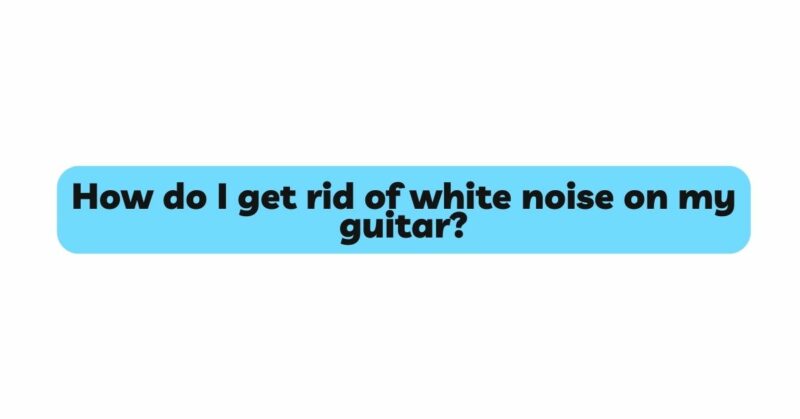As a guitarist, there’s nothing more frustrating than dealing with unwanted white noise that ruins the purity of your sound. White noise can be caused by various factors, including electrical interference, grounding issues, improper cable connections, or even low-quality equipment. To achieve the best possible sound from your guitar, it’s essential to learn how to effectively eliminate white noise. In this article, we’ll explore a range of solutions and techniques to help you get rid of white noise on your guitar, allowing you to focus on your music without any distractions.
- Quality Instrument and Cables
Before delving into complex troubleshooting, it’s crucial to ensure that your guitar and cables are of high quality. Low-quality guitars or cables can introduce unwanted noise into your signal chain. Investing in a well-built guitar and using reputable cables can significantly reduce the chances of white noise issues.
- Proper Guitar Setup
A well-set up guitar plays a vital role in minimizing unwanted noise. Ensure that your guitar’s action, intonation, and neck relief are adjusted correctly by a professional guitar technician. A proper setup can also prevent rattling or buzzing sounds that might be mistaken for white noise.
- Evaluate Your Power Supply
Often, electrical interference from the power supply can lead to white noise. Using a high-quality, isolated power supply designed specifically for musical instruments can help to minimize this problem. Avoid using cheap power strips or adapters that may introduce noise into your signal chain.
- Check Your Grounding
Improper grounding is a common culprit for white noise issues in guitars. Ensure that your guitar’s grounding is in proper working condition. You can use a multimeter to check the continuity between the ground points in your guitar’s circuit.
- Use Quality Guitar Cables
Using quality guitar cables with proper shielding can significantly reduce interference from external sources, such as power lines or electronic devices. Invest in reputable brands known for their durable and well-shielded cables.
- Pedal Placement and Buffering
If you use guitar pedals in your signal chain, their placement can influence the presence of white noise. Experiment with different pedal arrangements to see if relocating certain pedals helps reduce noise. Additionally, consider adding a high-quality buffer pedal at the beginning or end of your pedalboard to maintain a strong, noise-free signal.
- Noise Gates
A noise gate is a valuable tool to suppress unwanted noise during pauses or breaks in your playing. It acts as a virtual gate, cutting off the signal when it falls below a certain threshold. Noise gates can be built into some amplifiers or added as separate pedals to your signal chain.
- Hum Eliminators
In situations where the white noise is accompanied by a humming sound, a hum eliminator can be an effective solution. These devices are designed to eliminate ground loop hums and other types of interference, ensuring a clean and noise-free signal.
- Shielding and Ferrite Beads
Electromagnetic interference (EMI) can cause white noise in your guitar signal. Shielding the inside of your guitar’s control cavity and using ferrite beads on cables can help reduce EMI and eliminate unwanted noise.
- Clean Power Sources
When performing in different venues, the quality of the power supply can vary. Consider using power conditioners or voltage regulators to provide clean and stable power to your equipment, minimizing the chances of white noise issues.
- Eliminate Radio Frequency Interference (RFI)
Radio Frequency Interference (RFI) can introduce white noise into your signal chain. To reduce RFI, try to keep your guitar and cables away from sources of electromagnetic radiation, such as mobile phones, Wi-Fi routers, and other electronic devices.
- Eliminate Physical Vibrations
Physical vibrations, like those from stage rumble or nearby speakers, can cause noise through sympathetic vibrations in your guitar. Using a shock mount or isolating your guitar from vibrations can help minimize this type of white noise.
- Check Your Tubes (For Tube Amp Users)
If you’re using a tube amplifier, worn-out or faulty tubes can contribute to unwanted noise. Consider swapping out tubes to see if it improves the overall sound quality and reduces white noise.
- Test Different Guitars and Pickups
If you have access to multiple guitars or pickups, experiment with different combinations to see if certain setups introduce more white noise than others. Sometimes, the choice of pickups can influence the noise levels in your signal.
Conclusion
Eliminating white noise from your guitar requires a combination of careful troubleshooting, proper equipment selection, and attention to detail. By following the tips and techniques outlined in this article, you can significantly reduce or completely eliminate white noise issues, allowing you to focus on creating music with a clear, pristine sound. Remember that each guitar setup is unique, so don’t hesitate to experiment and tailor solutions to your specific needs. With persistence and patience, you can achieve a noise-free guitar signal that enhances your playing and overall musical experience.

